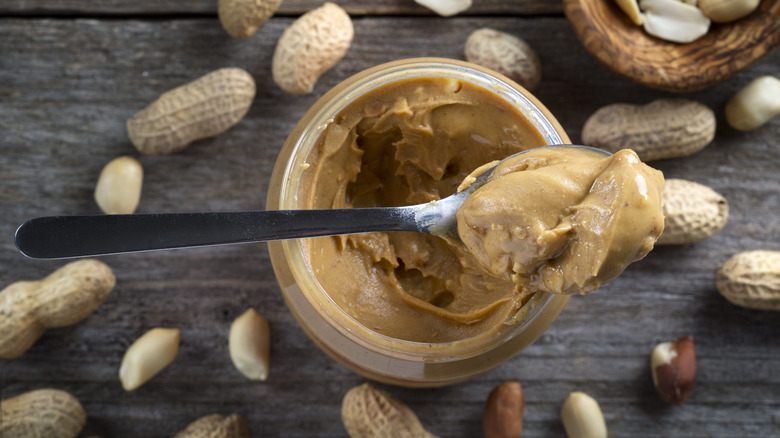What Happens To Your Metabolism When You Eat Peanut Butter Every Day
Your body's metabolism — the chemical processes that convert food into energy — is important for several reasons. In addition to sustaining important functions like breathing, blood circulation, regulating hormones, and growing and repairing cells, a healthy metabolism or increased metabolism means we burn calories quicker.
Several factors affect our metabolic rate, like our muscle mass, age, sex, body mass index (BMI), etc. Turns out that eating peanut butter every day can also positively influence your metabolism. For starters, the amount of protein in the popular nut butter spread (7.1 grams in two tablespoons in the smooth kind) helps you maintain healthy and strong muscles. Your resting metabolic rate or RMR (which is the rate at which you burn calories while your body is resting or involved in low-level activities like eating and going to the bathroom) is positively correlated to muscle mass. The more lean muscle you have (fat-free muscle), the higher your metabolic rate.
Per a 2009 study published in the Scandinavian Journal of Clinical and Laboratory Investigation involving 25 men and women, eating peanuts every day for two weeks (as opposed to eating candy every day for two weeks), caused an increase in the participants' basal metabolic rate or BMR (how many calories you burn when your body is doing the bare minimum functions like breathing and blood circulation).
The fiber in peanut butter aids your metabolism too
Peanut butter is a rich source of both soluble and insoluble fiber. Total dietary fiber in two tablespoons of the smooth stuff amounts to 1.6 grams, per the U.S. Department of Agriculture.
High-fiber foods not only keep you satiated for longer periods (which means you won't overeat), but they also slow down and improve digestion. Insoluble fiber is non-digestible, which means your body will burn calories while trying to break it down. In this way, the fiber content in peanut butter could boost your metabolism.
Furthermore, eating two ounces of lightly salted peanuts every day for about three months helped reverse metabolic syndrome — a cluster of risk factors related to heart health, according to a 2021 study published in The American Journal of Clinical Nutrition. Metabolic syndrome includes conditions like obesity, high blood pressure, bad cholesterol levels, and diabetes. According to Purdue University professor, Richard Mattes, (via Purdue News) who has also studied the role of regular peanut consumption in cardiovascular health, "Peanuts are rich in the types of fats that actually reduce cardiovascular disease risk and have strong satiety properties ... People can feel comfortable including them in their diet to take advantage of peanuts' reducing the risk of heart disease, without adding to body weight." Now that you know what peanut butter can do for your metabolism, should you go crazy with the spread? Probably not.
What are the downsides to too much peanut butter?
Too much of a good thing can be bad for you. This saying is true for most healthy foods, peanut butter included. Despite its heart-healthy fats, fiber content, protein, minerals like magnesium and potassium, zinc, and vitamin B-6, peanut butter is considered a high-calorie food, so eating too much peanut butter means you're putting yourself at risk of excess calories and weight gain.
Plus, healthy fats aside, peanut butter does contain some amount of saturated fat. So if you're concerned about cardiovascular health, portion control is important. The recommended intake for this popular breakfast food is two tablespoons a day. Try to choose a brand of peanut butter without additives and stick with just peanuts and a small amount of salt.
Something else to keep in mind is the food's phosphorus content (two tablespoons of the stuff has 107 milligrams), especially if you're deficient in other minerals like zinc and iron, as a lot of phosphorus in your system can mess with how these other minerals are absorbed into your system (via WebMD). Peanut butter is also high in inflammation-causing omega-6 fatty acids. Too much omega-6 is linked with irritable bowel syndrome, metabolic syndrome, obesity, diabetes, and asthma, per Dr. Axe. Finally, if you have a nut allergy, it goes without saying that you would have to exercise caution when consuming peanut butter for a boost in metabolism.


